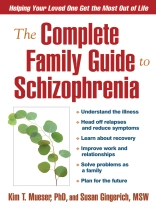Will the person you love ever get better? Chances are you’ve grappled with the question. With care and support from their families, people with schizophrenia can and do make vast improvements. Noted therapists Kim Mueser and Susan Gingerich deepen your understanding of the illness and cover a wide range of effective treatments. Based on decades of research and experience, they offer pragmatic suggestions for dealing with depression, psychosis, and other symptoms. They show you how to prioritize needs, resolve everyday problems, and encourage your loved one to set life goals. Plus, individual sections highlight special issues for parents, children, siblings, and partners. Whether you’re facing schizophrenia for the first time or you’ve dealt with its impact for years, you’ll discover innovative ways to handle challenges that arise over the course of treatment, from reducing the chances of relapse to making friends and finding work. Recovery isn’t an endpoint–it’s a lifelong journey. With love, hope, and realistic optimism, striving for it can lead to a richer, more rewarding life for your entire family.
Winner, NAMI/Ken Book Award
Table of Content
Foreword, Harriet P. Lefley, Ph D
Preface
I. An Overview of Schizophrenia
1. Schizophrenia: Basic Facts, Course, and Outcome
2. Diagnosis and Symptoms
3. Creating a Vision of Recovery
4. Comprehensive Treatment of Schizophrenia
5. Community Resources
II. Special Issues for Family Members
6. Parents
7. Siblings
8. Spouses and Partners
9. Parenting and Children
III. Preventing Relapses
10. Medications
11. Managing Stress
12. Developing a Relapse Prevention Plan
13. Responding to Crises
IV. Creating a Supportive Environment
14. Communicating Effectively
15. Solving Problems
16. Living in Harmony
V. Coping with Specific Problems
17. Psychotic Symptoms
18. Negative Symptoms
19. Cognitive Difficulties
20. Anxiety
21. Depression
22. Alcohol and Drug Abuse
23. Anger and Violence
24. Lack of Insight
VI. Improving Quality of Life
25. Social Relationships
26. Work and School
27. Independent Living and Self-Care Skills
28. Leisure and Recreation
29. Dealing with Stigma
30. Planning for the Future
Resources
About the author
Kim T. Mueser, Ph D, a clinical psychologist, is Executive Director of the Center for Psychiatric Rehabilitation at Boston University. His clinical and research interests include the treatment of schizophrenia and posttraumatic stress disorder and the diagnosis and treatment of people with multiple disorders. He has published extensively and lectures often on the topic of psychiatric rehabilitation.
Susan Gingerich, MSW, is a clinician and consultant with more than 20 years of clinical experience working with people who have severe mental illness and their families. She has an independent practice in Philadelphia.












